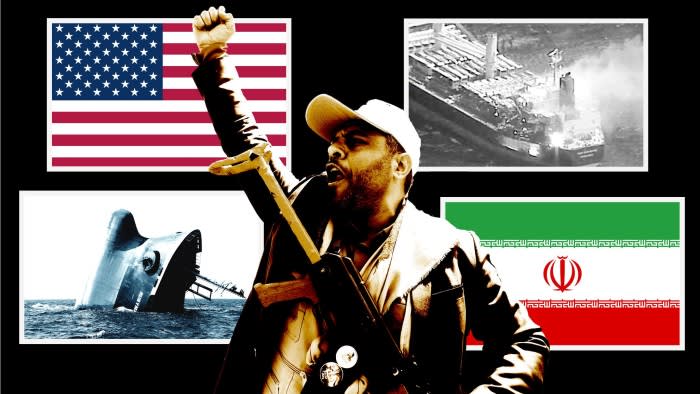Unlock the Editor’s Digest for free
Roula Khalaf, Editor of the FT, selects her favourite stories in this weekly newsletter.
Three senior members of Iran’s Revolutionary Guards were killed on Monday in an air strike on the consular section of Iran’s embassy in Damascus, an attack that Tehran has blamed on Israel.
The death of Brigadier General Mohammad-Reza Zahedi, a prominent commander of the Revolutionary Guards, marks a significant escalation in tensions that have engulfed the region since Hamas’s attack on Israel on October 7.
Iran’s network of proxies in the region — dubbed “the axis of resistance” — have since October engaged in exchanges of fire with Israel and attacked US forces and bases across the Middle East, leading to heightened fears of a broader regional conflagration.
But in recent weeks Tehran had sought to ease tensions with Washington in the wake of a January drone attack on a US military base on the Jordanian-Syrian border, which killed three American troops. Senior US and Iranian officials held indirect talks in January and both sides have shown signs of attempting to de-escalate the hostilities.
“The strike is the most serious escalation with deliberate intent designed to put Iran on the defensive,” said Sanam Vakil, head of the Middle East programme at the Chatham House think-tank. “Israel’s war is not just against Hamas, but very clearly designed to strike across the axis of resistance to weaken and deter the multiple groups.”
Vakil said that while Tehran has made clear it wants to avoid a direct conflict with Israel and the US, the strike on the embassy could “force Iran’s hand”.
Israel, which rarely confirms or denies strikes against targets linked to Iran, issued no comment on Monday’s strike.
The attack marks the fourth suspected Israeli attack on Tehran’s forces in Syria this year. At least six guards members and one military adviser have been killed in three separate incidents since January.
Zahedi, whose killing was confirmed by Iranian state news agencies, was a senior figure in the Quds forces, responsible for the Guards’ overseas operations. While his specific role in Syria has not been specified, he previously commanded Iran’s forces in Lebanon and Syria from 2008 to 2016.
His deputy, Mohammad-Hadi Haji-Rahimi, was among several others killed when the strike hit the building late on Monday afternoon. Hossein Aminollah, another senior commander of the Quds forces in Syria and Lebanon, was also confirmed dead.
Iran’s foreign minister Hossein Amirabdollahian said that Israel bore responsibility for the attack on the Iranian consulate, which was “a violation of all international commitments and conventions”. Syrian foreign minister Faisal Mekdad also condemned Israel over the attack.
Israel has struck hundreds of targets linked to Tehran and its proxies across Syria, including the Aleppo and Damascus airports, since Iran deployed troops in the Arab state to support Syrian president Bashar al-Assad during the country’s civil war.
Israel has long worried that the presence of Iranian forces, as well as fighters from Hizbollah, the Iranian-backed Lebanese militant movement in Syria, could enable its foes to establish a new front against the Jewish state.
But tensions between Israel and Iran have increased since October, leading to deadlier Israeli strikes targeting Iranian facilities.
Speaking to reporters in Damascus, Tehran’s ambassador to Syria Hossein Akbari said between 5 and 7 Iranian diplomats and military advisers had been killed in Monday’s strike.
Akbari claimed the “heinous act” was carried out by Israeli F-35 fighter jets launching six missiles.
“For the first time, the Zionist regime dared to target an official building of the Islamic Republic’s embassy carrying Iran’s flag,” Akbari said. Iran’s response would be delivered “at the appropriate time and place”, he added.
Iran withdrew some of its senior officers from Syria as the US vowed to respond to the January drone strike.
The withdrawal of the guards commanders was viewed as a sign of the Islamic republic seeking to de-escalate tensions with the US. While supporting militant groups across the region that have launched attacks against Israel and American forces, Tehran has repeatedly said it wants to avoid a direct conflict with the US and a full-blown regional war.
“Israel believes that Iran is effectively deterred, and is willing to risk a war in order to degrade significantly Iran and Hizbollah,” said Emile Hokayem, senior fellow at the International Institute for Strategic Studies. “This calculation will work until it will not, and then it will be catastrophic.”
The consular building, which was adjacent to the embassy, suffered heavy damage and shattered windows, Akbari said. The ambassador’s residence was in the consular building, Iranian state television said.
Photos and footage on regime-affiliated Telegram channels showed an Iranian flag flying amid heaps of rubble.
The strike comes four days after a series of suspected Israeli air strikes killed a number of Syrian regime soldiers, Hizbollah fighters and civilians in Aleppo. A separate Israeli strike on Damascus killed two civilians last Thursday, according to Syrian state media.
Additional reporting by Bita Ghaffari in Tehran
Read More: World News | Entertainment News | Celeb News
FT









